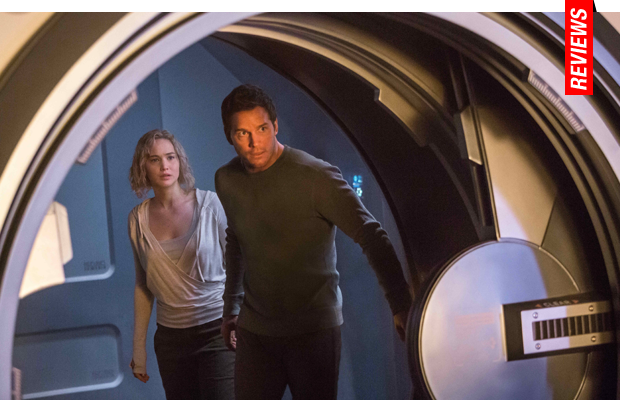Reviews
Passengers | Review
In Space, No One Can Hear You Snore: Tyldum Instills Insistently Dull Throb of Boredom in Sci-Fi Romance
 Where are they going and where have they been? You won’t be compelled to care either way about the unfortunate characters at the lukewarm heart of Passengers, a sci-fi melodrama tackled by Morton Tyldum of The Imitation Game. A screenplay passed around between studios, actors, and directors for the past decade (with names like Keanu Reeves, Reese Witherspoon, and Emily Blunt all associated with it at one time or another), it’s a film treatment which seems to have undergone so many shifts and tweaks and revisions the final product seems like something programmed by a crew of robots, including the rather underwhelming performances of its leads Chris Pratt and Jennifer Lawrence, whose preparation for their roles seems inclined solely towards obtaining the requisite physicality required of all actors starring in contemporary Hollywood features. On their way to a new Earth-like planet, two people are awakened early with ninety more years to go before their ship reaches its final destination, which means they will grow old and alone long before others will be awakened. As they struggle to find a solution to save their lives, a considerable secret about how one of them came to be awakened threatens the solace they’ve found in one another’s company.
Where are they going and where have they been? You won’t be compelled to care either way about the unfortunate characters at the lukewarm heart of Passengers, a sci-fi melodrama tackled by Morton Tyldum of The Imitation Game. A screenplay passed around between studios, actors, and directors for the past decade (with names like Keanu Reeves, Reese Witherspoon, and Emily Blunt all associated with it at one time or another), it’s a film treatment which seems to have undergone so many shifts and tweaks and revisions the final product seems like something programmed by a crew of robots, including the rather underwhelming performances of its leads Chris Pratt and Jennifer Lawrence, whose preparation for their roles seems inclined solely towards obtaining the requisite physicality required of all actors starring in contemporary Hollywood features. On their way to a new Earth-like planet, two people are awakened early with ninety more years to go before their ship reaches its final destination, which means they will grow old and alone long before others will be awakened. As they struggle to find a solution to save their lives, a considerable secret about how one of them came to be awakened threatens the solace they’ve found in one another’s company.
In a space ship containing a crew of five thousand plus sleeping inhabitants who have left behind Earth, (an overpopulated, highly expensive and polluted environment), mechanic Jim Preston (Pratt) is accidentally awakened ninety years too early. Unable to figure out how or why only his sleep was interrupted, he can only confirm he does not have the ability to put himself back into hibernation. For a year, his only contact is the robot bartender Arthur (Michael Sheen), but he finds himself drawn to the sleeping figure of Aurora Lane (Lawrence), daughter of a prize winning author who has big plans about journalism concerning their new life on Homestead II. Falling in love with her based on the information provided by the ship, Jim decides he cannot take being alone anymore and convinces himself to wake her up. Guiding her through the initial dismay of learning she will most likely die on the ship before it reaches where she wants to go, Aurora finds herself falling in love with Jim.
An immediate problem with Passengers is the milquetoast characterization of its two leads. Chris Pratt, while comically inclined to deliver the sort of suavity demanded by the modern masses, simply can’t generate interest when he isn’t allowed his usual crutches. While he garnered praise for Guardians of the Galaxy and the even less impressive Jurassic World, simply thrusting a handsome lead into the laps of several franchises can sometimes be a disservice, as the sobering tone instilled in Passengers only achieves utter banality from Pratt. Even worse is how we’re led to believe his emotional obsession with Lawrence’s Aurora begins considering she’s portrayed as an elitist whose witty comments are relegated to her love of caffeine in the manifests Pratt pores over as he decides who to choose as his ‘mate.’ But we aren’t allowed to explore the creepy side of his decision, and it seems the dark underbelly of Passengers has been scrubbed clean, because confusing audiences at the multiplexes is a cinematic sin.
What we have left is a somewhat unnerving Michael Sheen as a the robotic equivalent of the racist butler from The Shining (1980), a piece of artificial intelligence who seems to have ulterior motives suggesting a tangential (and infinitely more interesting storyline). But Pratt cannot be completely faulted here—Tyldum seems uninterested or unable to reign in Ms. Lawrence, who, once again, gives the impression of a little girl playing dress-up, even with some PG-13 style sex sequences which hardly assist with the lack of chemistry between the characters or the actors. Her Aurora Lane is as no-nonsense and self-assured as Lawrence’s media persona, but the problem is, Passengers plays like J.Law/Katniss Everdeen in space, but dressed up in problematic subplots involving the sort of wealth required for someone like her to be on the ship in the first place.
Passengers plays like Stanislaw Lem dredged in the corrugated pulp of romantic naiveté. Suggesting a sort of millennial Adam and Eve scenario, the inherent subversiveness of Jim’s actions in awakening Aurora, not to mention the hardwired class/caste system they are happily barreling off into across the universe, is drowned out by the film’s cookie-cutter packaging. Even if we can ignore inconsistencies (a state of the art space ship carrying five thousand plus lives would surely have more than one medical pod, right?), the bungled third-act aggressively sinks whatever good will some may have towards the film.
Somehow, (spoiler alert) Passengers suggests we champion Aurora to not only forgive Jim’s misdeeds and confirm her own sacrifice while they perilously and accidentally save the ship from collapsing upon itself thanks to the convenient appearance of Laurence Fishburne’s Captain, providing all their necessary accesses before he discreetly dies. Silly and disappointing, Passengers suffers from focusing on all the wrong aspects of a potentially intriguing narrative—and maybe a bit from the egos of its cast and crew.
★★/☆☆☆☆☆
Los Angeles based Nicholas Bell is IONCINEMA.com's Chief Film Critic and covers film festivals such as Sundance, Berlin, Cannes and TIFF. He is part of the critic groups on Rotten Tomatoes, The Los Angeles Film Critics Association (LAFCA), the Online Film Critics Society (OFCS) and GALECA. His top 3 for 2021: France (Bruno Dumont), Passing (Rebecca Hall) and Nightmare Alley (Guillermo Del Toro). He was a jury member at the 2019 Cleveland International Film Festival.


































